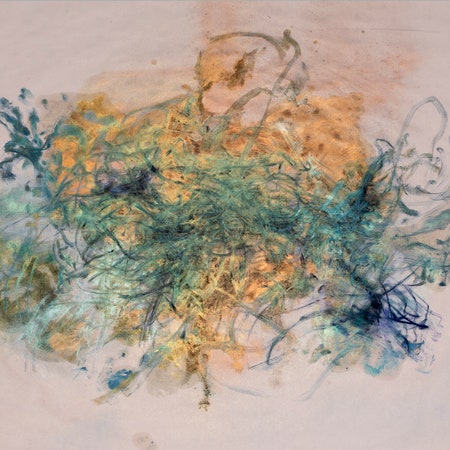Peculiar Contrast, Perfect Light, the official film of the Louis Vuitton 2021 fall-winter men’s show, is a suitably opulent and bugged-out curio of high celebrity culture. Saul Williams emerges from a snowy wilderness reciting poetry to himself, Louis luggage in hand, before the Revenant-like vista morphs into a sleek room decked out in green marble and filled with models. Yasiin Bey shows up and starts rapping. The director is Wu Tsang of the Moved by the Motion collective, which also counts among its members the three artists behind The Sport of Love: cellist and pianist Patrick Belaga, saxophonist and flutist Tapiwa Svosve, and producer Asma Maroof. After contributing to the soundtrack to Tsang’s film, the three decided they had more in them: a score to an imaginary romantic film, which I’d love to see if it’s as batshit as Peculiar Contrast.
The Sport of Love, though, is something a little less elaborate than their Louis Vuitton commission: a record of three talented and well-connected musicians inhabiting a sound and style. Maroof, half of the great post-club duo Nguzunguzu, shepherded Belaga and Svosve’s improvisations into a digestible package of just over half an hour. It’s telling that she leaves a snippet of a voice saying “OK!” at the beginning of the sublime Svosve flute showcase “Delicate Distance Between Boulders,” as well as a relieved laugh at the end of “Sport.” On top of the album’s more superficial explorations of what love might sound and feel like, this is an album about the electricity between improvisers finding common ground; it feels more like a real-time conversation than a carefully crafted statement.
Svosve’s saxophone is usually the lead instrument, with Belaga’s cello holding down the low end. In tandem with the romantic themes of the album, it’s easy to dream up associations with the sax-slathered recesses of ’80s cheese—Blade Runner’s “Love Theme,” George Michael’s “Careless Whisper,” countless late-night Skinemax themes—but the musicians only hint at that aesthetic without leaning into it the way Nguzunguzu did on their dreamy, R&B-heavy mashup album The Perfect Lullaby. The music is ramshackle and horizontal, rejecting vocals and drums entirely; I can’t recall anyone playing a chord. This is more in the ambient jazz tradition of Marion Brown’s collaborations with Harold Budd on The Pavilion of Dreams, the processed trumpet murmurs of Jon Hassell and Arve Henriksen, the heavy-lidded languidness of Pharoah Sanders’ performance on Promises: left-field players meeting easy listening halfway.
